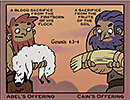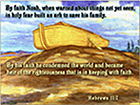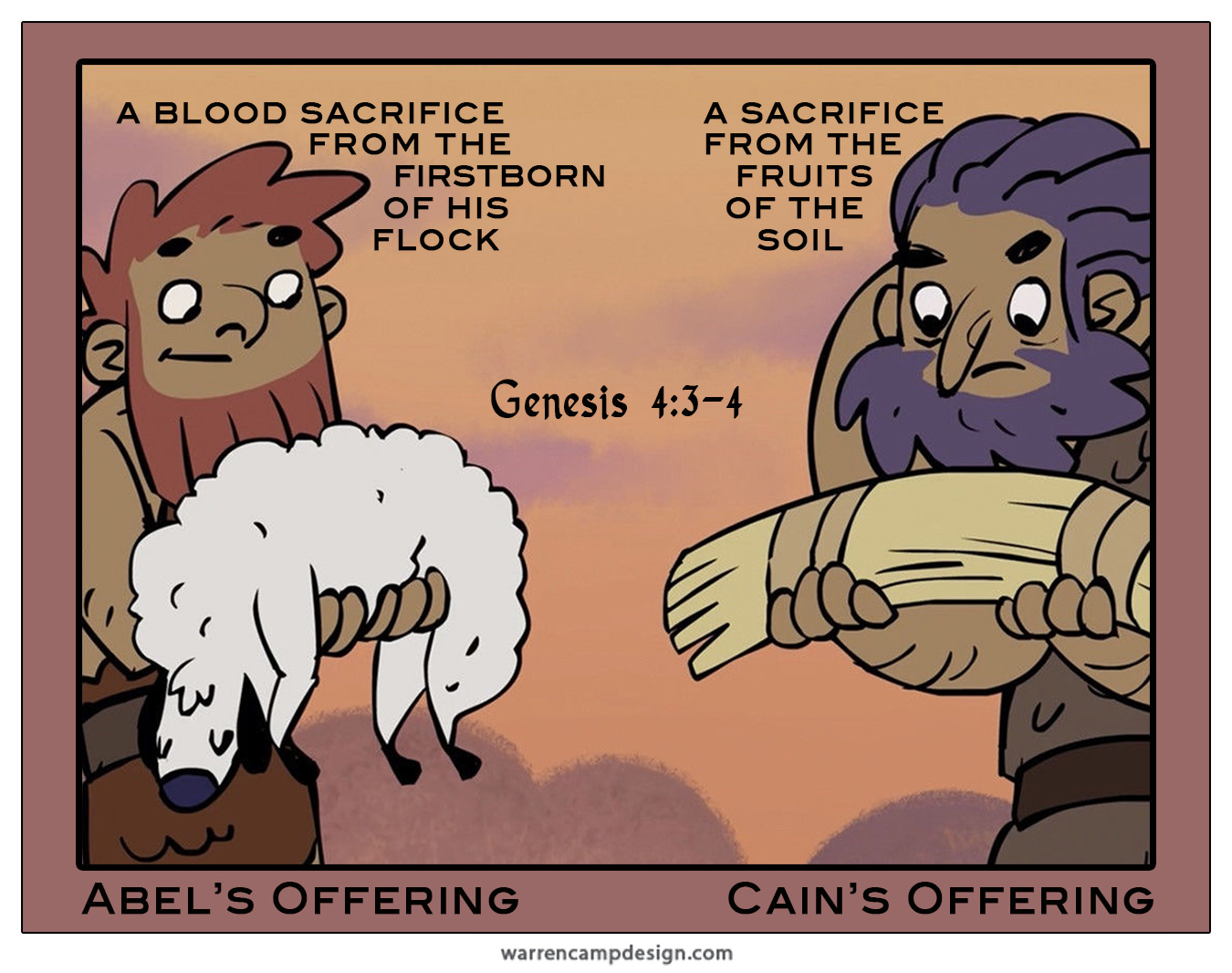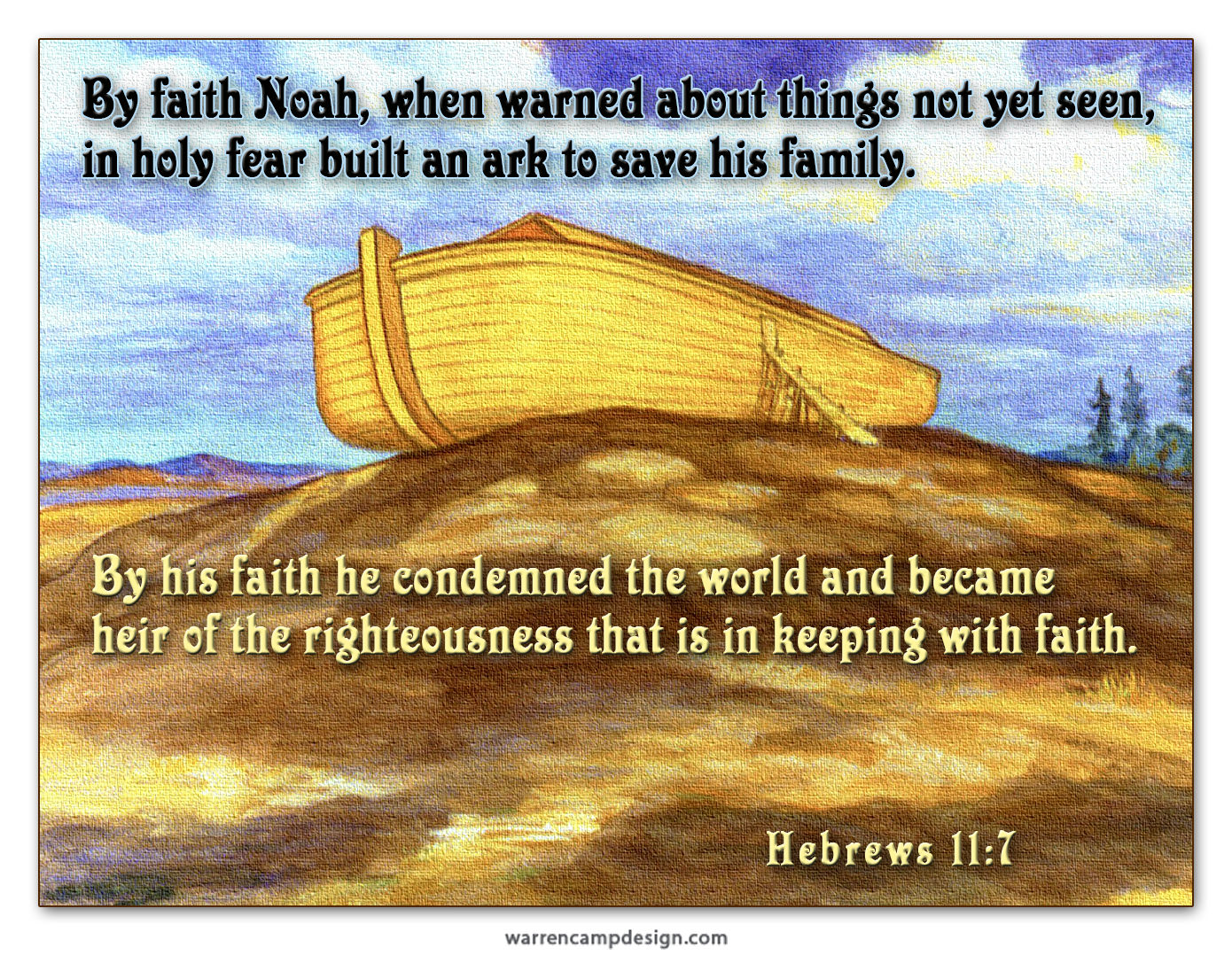Hebrews 11:1–7 . . .
“Faith: Definition and Examples”
Having examined in our last commentary titled "Warnings, Followed by Encouragement," we explored the likely meaning of 10:26–39, highlighting the author's call to persecuted, saved Jewish Christians — his brothers and sisters — to persevere in faith and remain unswervingly hopeful, we'll now start his infamous chapter about requisite faith. After encouraging them to endure, the author next advises them that their ability to survive depends upon their faith. He elaborates on faith being the means of endurance for Christians then and now. "Faith" is defined (vv. 1–3), then punctuated, by numerous faithful exemplars from the Old Testament, often referred to as honorary members of "The Hall of Faith." All of the included legends appear in chronological order (vv. 4–38).
This well-known chapter provided many relevant lessons for the original recipients of this epistle. Saved Jewish Christians had a great love and respect for the Old Testament and its saints. After reading or hearing chapter 11's faith-focused account, they discovered that their great faith heroes had much more than strong faith, because they behaved, lived, and were saved by that God-given faith. Undoubtedly, their gaining of the salvation gift had nothing to do with Mosaic Law or by the old covenant's sacrificial system, which is why there's absolutely no mention of either in this faith-specific chapter.
In this commentary, Warren will summarize the faith-based accounts of Abel, Enoch, and Noah. And in subsequent chapter 11 commentaries, he'll cover those of Abraham and Sarah, Isaac, Jacob, Joseph, Moses, Rehab, and many more.
Confident Hope and Understanding (11:1–3)
Chapter 10 ended with a warning, followed by words of encouragement, specifically referring to "those who have faith" versus "those who shrink back" by trusting in the old covenant's lawful practices of animal sacrifices (10:39). Chapter 11 begins directly by defining "faith" as a confidence and assurance in the person and promises of God, whom we're unable to see. Since confidence and assurance are intangible, God rewards those who truly demonstrate faith in him.
Faith in Action
11Now faith is confidence in what we hope for and assurance about what we do not see. 2This is what the ancients were commended for.
3By faith we understand that the universe was formed at God’s command, so that what is seen was not made out of what was visible (11:1–3).
The first two verses, among the most quoted from this epistle, prepare us for what follows. If our faithful response to God saves us from sin and death, then the essential qualities of this saving faith are among the most important topics we hearty disciples can study. The fundamental fact of existence is that this faith, this trust in God, is the firm foundation that makes life worth living; it helps us realize and appreciate what we can’t see. Active faith is what distinguished our ancestors, ancients, or elders, setting them above the crowd. They're the church’s celebrated pioneers through whom God had spoken (cf. 1:1).
A faith-filled life is based upon trust in God at all times. We who trust God fully and continually know that he created the world and everything in it. He spoke this command — "Let there be light" and it was so (Genesis 1:3), ordering the universe's creation, which had never existed previously. We have faith in the truth of these facts because God's holy Word tells us of them. We thereby faithfully trust that his Word is true. There's no way to approach or to please God than to come to him through faith in the truth about Jesus Christ and his sacrificial death in our place.
By faith, we see the world called into existence by God’s Word; it's what we see created by the divine entity that we cannot see with the human eye; it's the creative work of our unseen God (v. 3). The author uses the term "By faith" repetitively (21 times in this chapter in the NIV, while "faith" is used 38 times throughout this epistle, as shown on this list). It refers to the essence of what Christians hope for: the promise of God’s coming kingdom. True, no one has ever seen the act of creation; but we know through faith and by reason that the universe was created by a brilliant, most ingenious Designer. Faith is having confidence in such unseen things, resting assured that they are or will become reality. Our faith in God is the basis for mankind’s approval and commendation by him.
Faithful Abel, Enoch, and Noah (vv. 4–7)
Just as the old covenant's heroes had faith in the promises of God, so all believers should have faith in the promises of God's new "Revelation."
4By faith Abel brought God a better offering than Cain did. By faith he was commended as righteous, when God spoke well of his offerings. And by faith Abel still speaks, even though he is dead.
5By faith Enoch was taken from this life, so that he did not experience death: “He could not be found, because God had taken him away” [quoted from Gen. 5:24] For before he was taken, he was commended as one who pleased God. 6And without faith it is impossible to please God, because anyone who comes to him must believe that he exists and that he rewards those who earnestly seek him.
7By faith Noah, when warned about things not yet seen, in holy fear built an ark to save his family. By his faith he condemned the world and became heir of the righteousness that is in keeping with faith (11:4–7).
In the following four verses, the author gives examples of men from general history — Abel, Enoch, and Noah — who demonstrated faith while living prior to Israel's founding. Each of these people faithfully trusted in God's promises.
Abel's example (v. 4) Cain and Abel were first two sons of Adam and Eve. Cain, the firstborn, become a farmer while Abel became a herdsman or shepherd. Abel offered his sacrifice through his faith in God's promise (Gen. 4:1–8), providing a blood sacrifice from the firstborn of his flock. Cain worked the ground, growing crops that he'd present to the Lord from the "fruit of the soil." A problem arose that dealt with the offering and the offerer: Yahweh approved of Abel and his offering, but he advised Cain that he was displeased with him and his sacrifice. He became jealous of Abel's righteous act and his acceptance with God. Consequently, he angrily responded to God’s disapproval by killing his brother — this was Scripture's first recorded murder. Interestingly, Abel’s innocent death wasn't unlike Jesus' death.
God, having examined Cain, "did not look with favor on him and his offering," causing him to become very angry (Gen. 4:5). Although the Scripture doesn't exactly reveal the failure(s) of Cain and his offering, he understood what was required of him but refused to do it. The author makes the obvious point that Abel was acceptably righteous because of his faith. His acceptance, as recorded in Scripture, continues to be remembered, thousands of years after his death; though dead, "by faith Abel still speaks." This documents the value and importance of how one's living by faith can inspire others to remain faithful.
As defined above, faith is a forward-looking trust that God will make good on his promises, even when their fulfillment is "unseen" to us. Abel faithfully obeyed God's commands and was accepted by God. As the writer of "Hebrews" documents, it's this trusting faith, not ritualistic actions, that brings God's commendation. Note: Abel's blood sacrifice didn't cleanse him from sin (Hebrews 10:3–4); it was his faith in God that saved him.
Enoch's example (vv. 5–6) While Abel suffered the worst possible end to his earthly experience, being violently murdered, Enoch, something of a mystery man, never had to die at all. The fact that God took him directly to heaven, without first experiencing death, shows that Enoch must have had extraordinary faith in God, which enabled him to receive the Lord's blessings. It's important to realize that Enoch, who prophesied in the seventh generation from Adam, was a good man who lived at a time that preceded the requisite "flood." Also note that, although Abel died because of his faith, Enoch's faith spared him from death; he "walked faithfully with God 300 years" (Gen. 4:17–18; 5:18–24). Although "God had taken him away" (to heaven) because of his faith, we're not informed of any particular action of Enoch’s that might have caused God to be pleased, such that he pronounced and applauded his righteousness.
It's worth noting and remembering that faith in God and faith in his Word can't be separated. So, when Apostle Paul tells us that "Consequently, faith comes from hearing the message, and the message is heard through the word about Christ" (Romans 10:17), we must recognize the importance of our need to "hear with faith." Add to this what he wrote to the church of Galatia, whose members, similar to the readers of "Hebrews," came from a Jewish background, often plagued with the temptation to convert to Judaism. He asked them directly: "I would like to learn just one thing from you: Did you receive the Spirit by the works of the Law, or by believing what you heard? Are you so foolish? After beginning by means of the Spirit, are you now trying to finish by means of the flesh?" (Galatians 3:2–3). Without faith it's impossible to please God. Those who follow God must read and believe his Word, realizing that he genuinely rewards those who seek him faithfully.
Enoch’s faith was apparently so strong that we read that he walked steadily with God (Gen. 5:24). His faith was demonstrated by his unwavering godly lifestyle while living in a morally wrong culture that was destined to be eradicated as a consequence of its shameless perversion. Because of his faith, God took Enoch straight to heaven without dying. Our author didn’t write that it was difficult to please God without faith; he said, "without faith, it is impossible to please God." Two things are required to fully trust in God: We must be certain that God exists and that he'll reward those who believe, seek, and follow him (v. 6).
Noah's example (v. 7) As with the first two exemplars, Noah acted as he did because he trusted what God had revealed to him about the future. Being "a righteous, blameless man among the people of his time, who walked faithfully with God" (Gen. 6:9), his strong faith is demonstrated by his agreeing to God's directive to build an ark in the middle of nowhere, that was to float on a big body of water that had never been seen by anyone.
Shortly after turning 500 years of age, Noah became a father. He had three sons: Shem, Ham, and Japheth. You might be interested in this because Noah is your great, great, great grandfather. The whole race is descended from Adam through Noah, and from Noah through his three sons. All of us have either Shem, Ham, or Japheth as our relative. While Noah was raising his family, God told him to build the ark. He and all three sons faithfully constructed a huge ship at Father God's direction, on land that was absolutely void of water, in anticipation of an unseen flood.
Those were awful days: "The Lord saw how great the wickedness of the human race had become on the earth" (Gen. 6:5a). People were wicked and evil. "But Noah found favor in the eyes of the Lord" (5:8). Noah would spend 120 years building this huge boat, which was one third the size of the Titanic. There'd been no rainfall in the first year; none in the 30th year; none in the 50th year. Shortly after turning 600, Noah, his wife, sons, and daughters-in-law, entered the ark, as God literally opened the floodgates. It rained continuously for forty days, causing the disastrous flood.
Noah warned the people of his day about the upcoming flood that God would bring about. Not believing him, they likely laughed at him, since there'd never before been a flood! Obviously, Noah would have had to focus on his unresolved concerns that the author referred to as "things not yet seen," such as physical evidence of an impending flood. Nevertheless, Noah chose to trust God. Such trust, adequate enough to facilitate obedience, was what our author acclaimed as the "faith" by which we believers are to live. Only Noah and his family and the animals on board the ark remained safe when the flood came; the remaining population of wicked people drowned. Noah trusted God and was right with him. As a result, he received the good that God had promised to provide all those who'd choose to trust him.
What's the point? Today's passage is about putting our trust in God, based on what we can see, in order to rely on him in those areas where we cannot see. This perspective is especially important when reading these and upcoming verses about biblical figures. In each case, their faith was demonstrated by their obedience to God, despite a lack of visibility and complete knowledge. God takes what’s “unseen to us” and eventually makes it visible to us.
This chapter's accounts are vitally important for today’s readers because they clearly spell out what living by faith really looks like in real time. Our author will continue demonstrating in this chapter how many more of the old covenant's great faith-filled men and women continue to speak to us today, following their death thousands of years ago. The text emphasizes the powerful contribution that today's men and women make by living faithfully, thus setting examples for us to emulate. It would be good for us to listen to, admire, and follow them.
Remember this: It's often difficult to trust what we can't touch or see or completely comprehend. But our faith in Christ, made possible by the Spirit of Jesus, helps us to believe more than we can see.
"Father: Thank you for being our Author and Perfecter of faith, so that the measure of our faith — when we face obstacles — fully relies on your strength, not our own. Amen."
Closing Considerations (from Dr. Charles Stanley)
It's the Lord's desire that we walk by faith. Honestly, most of us will find a number of areas where we struggle to trust Him. Some days, it's easy to relinquish control; other days, we quickly take matters into our own hands.
Thankfully, our heavenly Father is patient and loving. His Word clearly teaches that sanctification is the process — not the end result — of making us holy. God shows us how to learn, then live, according to our faith in Him. When we step out in faith, experiencing Christ's provision and dependability, our trust grows. Living on the basis of trust in Christ requires our belief, followed by our action. As we allow Him to lead, our faith will grow.
But, developing steadfast trust also takes time. We're born spiritually through simple, childlike faith that starts the moment we choose to ask Jesus to become our Lord. Convictions are nourished by a growing knowledge of God and a deepening confidence in Him. Experiencing his protection, provision, and power, in moments that test us, strengthens our beliefs.
Hebrews 11 is filled with numerous examples of obedience that are critical to maintaining steadfast faith. Knowing and trusting God through His Son, experiencing His presence, and living obediently are the elements needed to develop an unshakable faith. With the Holy Spirit's help, each of us can indeed develop unwavering faith.
- Q. 1 Why is the creation of our universe so important to faithful believers?
- Q. 2 What sets Abel and Cain's sacrifices apart from one another? Why was Abel’s better?
- Q. 3 Which of the text's three exemplars had the faith that you'd like to emulate? . . . Why?
Hebrews 11:1–7
New International Version (NIV) or view it in a different version by clicking here.
— Listen to chapter 11, narrated by Max McLean.







